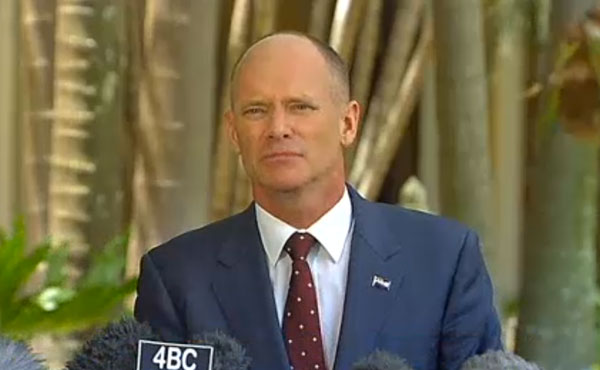When Queenslanders get off the beach and start to think about the upcoming election, there is a long list of issues that might influence their votes.
Jobs, economy, health, public transport, education, candidates’ personalities, bikies, state debt, the environment… the list goes on, and on, and on.
One issue that has so far been completely ignored is the rising, and fatal, issue of domestic violence.
Domestic violence was a key policy area for both the Labor and Liberal parties in the Victorian election, recognising that the death of women and children in that State was a price too high to pay.
The lack of interest in this issue by our Queensland political leaders is inexplicable, given that police attend an average of 175 domestic violence incidents every single day.
In 2012-13, QPS data shows that a total of 64,246 domestic violence occurrences were reported, while 22,890 originating applications were made for Protection Orders in Queensland Courts.
These numbers are huge, and the impact can be fatal.
In Australia, a woman is hospitalised from domestic violence related injuries every three hours.
The Australian Institute of Criminology reported that 36 per cent of all homicides take place in a domestic setting and 73 per cent of these involve a woman being killed by a male partner or former partner.
Each year in Australia, on average 72 women die because of domestic and family violence, and there were 23 confirmed deaths linked to domestic and family violence in Queensland in 2011-12.
Rates of death in Queensland by domestic violence are among the nation’s highest, and the rate of incidents is rising – by an average of 7 per cent each year for the past 10 years, and still going up.
It also takes an economic toll on the State. When lost productivity and the financial impact on justice, health and social services are taken into account, KPMG estimates the cost of domestic violence to Queensland is $111 million per annum.
For every woman whose experience of violence can be prevented there is a cost saving of approximately $20,766.
These statistics, and the horrific personal stories that sit behind each and every number, demonstrates the great need for new approaches and for increasing available services to work towards reducing the incidence of domestic and family violence in Queensland.
So, what plans do our political candidates have in this important area of social policy?

There is no mention of domestic violence in the LNP’s policies for this election, and it hasn’t been a major focus since winning the 2012 election.
The Government should be commended for providing funding to Women’s Legal Service Queensland and establishing the Domestic and Family Violence Taskforce chaired by Dame Quentin Bryce. But that group isn’t due to report until February – after the election.
The government-controlled parliamentary inquiry into crime recommended a large number of actions to address domestic violence – perhaps the LNP could adopt some of these sensible reforms as policy positions?
Labor’s policy, released quietly in November 2014, will increase penalties for domestic violence order breaches; allow evidence of history of domestic violence; treat domestic violence as an aggravating factor in sentencing, and ensure victims can access victims’ assistance.
All of these measures focus on the consequences of domestic violence, and more needs to be done to intervene early to prevent domestic violence.
Minor parties Katter’s Australia Party and Palmer United have no policies in this area, while the Greens promise additional resourcing for police to respond effectively to domestic and family violence, including increasing the availability and number of Domestic Violence Liaison Officers to ensure adequate supervision of general duties officers.
In 2013-14, Queensland’s community legal centres provided almost 5,500 instances of legal advice to clients in the area of family violence, and provided ongoing casework/representation in over 1,100 matters.
In addition, a large (but immeasurable) number of clients accessing Queensland community legal centres with other legal problems have experienced domestic or family violence. With this experience, and working to support our client communities’ legal needs, we see a number of areas that need immediate improvement, and that should be adopted by political parties in the lead-up to the election.
Working with specialist domestic violence services and guided by the direct experiences of people who have been victims of domestic violence, the Queensland government should develop a Queensland domestic violence strategy to reduce domestic and family violence across the state, to be overseen by a high-level committee of government, service providers, and people with lived experiences of violence.
A key plank of the strategy should be community education, to reduce violence.
Queensland should also increase specialised training for first responders, including police and emergency services, and court staff about domestic and family violence issues.
The current lack of legal assistance available to people attending Queensland’s domestic violence courts to apply for a domestic violence order, or respond to an application for an order, results in trauma, unjust outcomes, and increased system-wide costs (financial and social).
Community legal centres should be resourced to implement a state-wide domestic violence duty lawyer service, targeted to those people who are unable to afford a private solicitor, have been refused Legal Aid assistance and/or may be experiencing economic, social, mental, cultural, demographic, language or other barriers to accessing the legal help they need.
Finally, the Domestic and Family Violence Taskforce reports after the election, so all parties should commit to delivering on the taskforce’s recommendations.
Domestic violence is a horrific crime with lasting social impacts. Our politicians must recognise this, and ensure that they commit to addressing and reducing domestic violence in Queensland.
*James Farrell OAM is director of the Queensland Association of Independent Legal Services, and a White Ribbon Day ambassador. @_jamesfarrell
Donate To New Matilda
New Matilda is a small, independent media outlet. We survive through reader contributions, and never losing a lawsuit. If you got something from this article, giving something back helps us to continue speaking truth to power. Every little bit counts.



